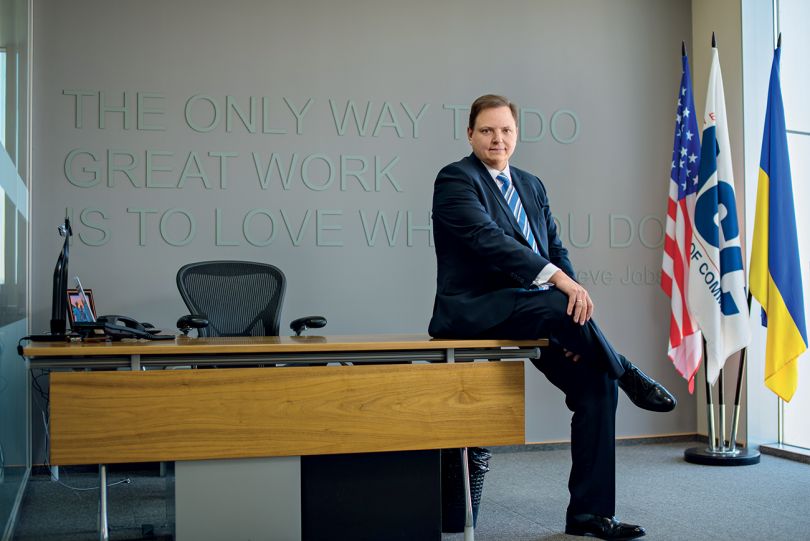Strategy and culture are among the primary levers at top leaders’ disposal in their never-ending quest to maintain organizational viability and effectiveness. Strategy offers a formal logic for the company’s goals and orients people around them. Culture expresses goals through values and beliefs and guides activity through shared assumptions and group norms. Our speakers name the components, which help to implement a strong company culture to ensure that all employees projected one consistent and effective working style.

Olena Volkova, Partner at PwC
At PwC, corporate culture is not just empty words, it is the essence of how our people feel, interact and work. As the main asset of PwC’s corporate culture is our people. Our people-focused approach allows PwC network of firms to ensure the successful achievement of our corporate purpose: build trust in society and solve important problems.
Corporate values are important but the environment in which these values are implemented is even more important. We stand for making our workplace supportive and do our best to offer great career opportunities to our employees as part of our corporate culture that respects work-life balance and diversity.
1. Culture of work flexibility
Flexibility is an integral part of PwC’s corporate culture that our employees experience and enjoy every day. PwC’s culture of “everyday flexibility” allows our employees to work where and when they choose. An employee may be on a business trip or work at home, if needed, and be able to join an important meeting or call via Skype.
To the word, our electronic corporate signature contains the following phrase: “At PwC, we work flexibly – so whilst it suits me to email now, I do not expect a response or action outside of your own working hours”. It is about trust and respect to each other.
As a part of our culture of work flexibility, PwC has evolved our dress code policy to “dress for your day”. We dress in a way that reflects our working day: employees may choose what to wear at the workplace every day based on their business schedule. We appreciate when our people feel comfortable and relaxed, and if more casual dress code brings them this feeling, we are happy to support it.
2. Using technologies to reinforce corporate culture
No doubt, emerging technologies have hugely changed the way PwC works and influenced many aspects of our business, including our corporate culture. PwC is a tech-enabled firm using new tools, artificial intelligence and technologies both internally and in the process of delivering services to our clients.
Putting our people first, it is vital for PwC to provide all possible opportunities to our employees so that they are able to keep pace with the times and stay abreast of new technologies. Our aim is to keep PwC's people on top of the latest innovations and develop a digital mind-set. We believe it is important to digitalize business processes and delegate all the possible pieces of work to “smart technology systems”, thus, allowing our people to focus on other challenging tasks.
3. Informal way of communication & teamwork
At PwC, we do believe that the way we communicate with each other is one of the main components of our corporate culture.
The tone of voice with our clients is similar to the way we communicate internally in our teamwork. We respect each other and opinion of each team member makes the difference. The way managers delegate tasks to their teams does not have the nature of command but a kind request. To reinforce a decision or action, you may communicate it by email or orally. Whilst such request is not worded as a formal order, it is perceived as mandatory and binding. The effect of an informal way of communication is amazing; it adds a human touch to corporate environments and makes it natural. Y
ou may believe me or not, but after joining PwC, an introvert has no chances to avoid becoming an extrovert. This is an effect of the teamwork, which makes us PwC.
Cross-lines of service collaboration and working together with our global network is our strengths. This is what makes us PwC.
At PwC, people work with outstanding professionals, share their experience and learn more than you thought possible. We work closely together every day and it is absolutely impossible to feel not engaged. From the moment professionals come on board, they are treated as part of the PwC family and their day-to-day work builds on the one team approach.
By understanding what your employees really want, you can create a corporate culture that is unique to your company. At PwC, it is all about people, teamwork, collaboration and respect to each other. “Corporate culture’s components encourage employees to go above and beyond”.

Andy Hunder, President of the American Chamber of Commerce in Ukraine
"Culture eats strategy for breakfast" is a well-known phrase originated by Peter Drucker. In his book Delivering Happiness, Tony Hsieh wrote: "For individuals, character is destiny. For organizations, culture is destiny". The rules for conducting business in Ukraine have been changing significantly over the last quarter of a century. Today, every successful business has its own corporate culture, but they all have at least three common components: leadership, values, and love for their business.
1. Leadership Support
Employees should feel that their leader – boss, manager, CEO – appreciates and supports them. A successful leader has enough abilities, good intentions and a holistic view of the changes – and employees are aware of this. The quality of the team depends on how managers treat and lead their employees.
2. Value-Based Approach
In a climate of confidence, values crystallize. According to a Deloitte poll, 87% of people believe that corporate culture is important. At AmCham Ukraine we have six key values that all our team is stick to – Integrity, Compliance, Excellence, Transparency, Service and Commitment.
3. Love For Your Business
True success cannot be achieved without inspiration, and business is a work that never ceases. If a sphere does not inspire you, then it will be impossible both to create a revolutionary product and to find strength for everyday work. Steve Jobs once said – “The only way to do great work is to love what you do”. This quote is proudly engraved my office wall and that’s our internal AmCham Ukraine philosophy.

Olivia Allison, Partner, Head of Forensic & Risk Consulting KPMG in Ukraine
"Corporate culture” has become a buzz phrase in the modern business world, though it can sometimes still sound like a fantasy land, where people somehow act consistently across cultures. But every corporate has a culture, even if it is not defined and clearly communicated, and each manager and leader in the business builds it consciously or not by the way s/he behaves. If the right culture is developed and rewarded, it can bring teams together and inspire success, even across different offices and countries.
Here is my three components of a good corporate culture that motivates growth:
1. Build a safe space
There are two main ways to motivate people at work: make them constantly afraid of failure, or give them a safe space to learn and grow. Studies have shown that many businesses hire “insecure overachievers” [Harvard Business Review], who then overwork and achieve success through anxiety. This works in the short-term, but people burn out. Worse, they may not be honest about what’s working (or not). In today’s changing environment, you need to know quickly about potential issues, so you can change strategy. That means people need to feel safe enough to tell the truth. Find out what’s causing stress and anxiety in your team, and work to fix it. Start with simple things – make reporting lines and KPIs clear, so people know how they are assessed. This is an important foundation of a good culture.
2. Reward stability and agility
The tech industry constantly talks about agile business – about how important it is to “fail fast.” At the same time, many leaders in more traditional businesses are criticized for rewarding cool ideas rather than things that are working in practice. It’s important to strategize in two directions: maximizing what already works well, and experimenting to drive new growth. This will help to ensure that “fast failure” doesn’t jeopardize the business overall. It also allows you to motivate different types of employees: those who prefer stability can maintain existing business, while restless people can work on new products and approaches.
3. Act before you know everything…
… and motivate your team to do the same. If you see a new business opportunity, do your research, take the opportunity. But don’t wait until you have all the answers; it will probably be too late. (And usually, even if you think you know everything, you don’t.) Encourage proactivity and new ideas. Engage as many diverse opinions and views as you can. You have to take calculated risks to be successful in business.
Together, these constitute a corporate culture that allow your team to take risks but to feel supported and rewarded to succeed. Natalia Kyrylenko







